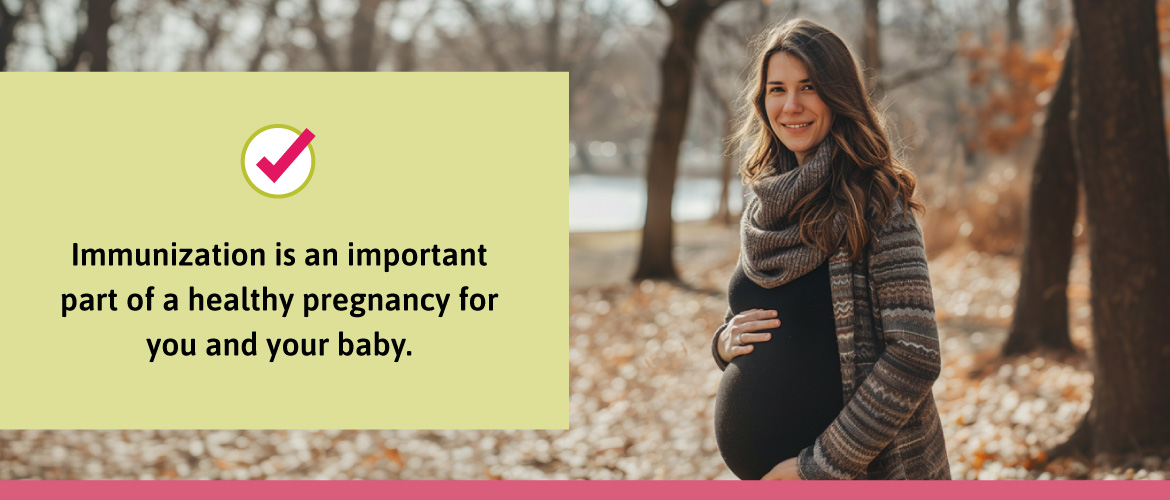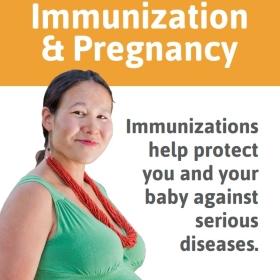On March 31, the ImmunizeBC website will move over to HealthLinkBC.ca After this date, you will be automatically redirected to HealthLink BC’s Immunization landing page. HealthLink BC provides trusted health information online and over the phone 24 hours a day, seven days a week by calling 8-1-1.
Date last reviewed:
Monday, Jan 20, 2025

Before becoming pregnant, it's important to make sure you're up to date on your routine vaccines. This is especially important for certain vaccines, such as the measles, mumps, rubella (MMR), and chickenpox (varicella) vaccines. These vaccines are not recommended during pregnancy but provide important protection. For example, the MMR vaccine protects against rubella, a contagious disease that can cause miscarriage and birth defects.
Your doctor or a nurse at your local health unit, community health centre, primary care clinic, or nursing station can check your immunization record. Depending on your immunization history, you may need some additional vaccines. Ensuring you are up to date on all your routine vaccines will help protect you and your baby from diseases that could cause serious harm. Find information on locating immunization records.
It's also important to make sure that everyone in your household is up to date on their immunizations; this lowers the chance of a household member getting a vaccine-preventable disease and passing it on to you or your baby.
Information
Vaccines In Pregnancy Canada website
Are you looking for more information on vaccines in pregnancy? The Vaccines In Pregnancy Canada website offers evidence-based information and resources to empower pregnant people and their supports to make informed and confident decisions about vaccination in pregnancy.
Immunization during pregnancy
It is recommended that pregnant people get vaccinated against:
- Pertussis (whooping cough)
- Influenza (flu)
- COVID-19
When you receive these vaccines during pregnancy, your body produces protective antibodies that are passed to your baby. These antibodies help protect your baby from these diseases during the first few months of life, when they are most vulnerable.
Other vaccines may be recommended in certain situations, such as when travelling or if you are at high risk for certain diseases. Some of these vaccines are free, and others you may need to buy.
Expand the tabs below to learn more about vaccines recommended during pregnancy, why they are important for protecting you and your baby, and when you should get them.
- Influenza (flu) vaccine
-
It's recommended that all pregnant people get the inactivated flu vaccine (given as a needle in your arm). The nasal spray flu vaccine is a live-attenuated vaccine and should not be given during pregnancy.You can get the flu vaccine at any stage of your pregnancy, no matter your trimester. The flu vaccine is free.Getting the flu vaccine during pregnancy helps protect you against serious illness. It also protects your baby and gives them early protection against the flu for several months after birth.How the flu vaccine protects you
- Pregnant people who get the flu are more likely to have serious illness and to be hospitalized compared to non-pregnant people of similar age. Changes that happen in your body during pregnancy, affecting your heart, lungs, and immune system, can make it harder for your body to fight infections, even if you are otherwise healthy.
- Getting the flu vaccine during pregnancy makes it much less likely that you will get the flu, have severe illness, and end up in the hospital.
How the flu vaccine protects your baby- When you get the flu vaccine, your body produces protective antibodies against the flu. When you are pregnant, these antibodies pass to your baby through the placenta and provide your baby with protection against the flu for several months after birth. This early protection is important because babies can get very sick from the flu but can't get the vaccine until they are 6 months old.
- Babies born to people who got the flu vaccine during pregnancy are much less likely to be hospitalized with the flu in their first 6 months of life.
- Babies born to people who got the flu vaccine during pregnancy are also less likely to be premature, small for gestational age, and have low birth weight than those born to people who didn't get a flu vaccine. In addition, vaccination during pregnancy has been shown to protect against stillbirth.
Timing of flu vaccination- Try to get the flu vaccine as soon as it's available; this helps protect you before flu activity increases. In BC, flu vaccines are usually available in October.
- You can safely get the inactivated flu vaccine at any time in your pregnancy, including in the first trimester.
Learn more about influenza (flu) vaccines.
- Tdap (tetanus, diphtheria, pertussis) vaccine
-
The Tdap vaccine is recommended in every pregnancy, even if you’ve received it before.Getting the Tdap vaccine during pregnancy is the best way to protect your baby from pertussis and its complications during the first months of life.How the Tdap vaccine protects your baby
- Pertussis can be serious for anyone, but it is especially dangerous for babies. It can make it hard for babies to breathe and can be deadly. However, babies are not able to get the pertussis vaccine until they are 2 months old.
- When you get the pertussis vaccine, your body creates protective antibodies. When you are pregnant, these antibodies pass to your baby through the placenta and give your baby early protection against pertussis when they are most likely to get very sick.
- Studies show that pertussis vaccination in pregnancy protects about 9 of 10 babies less than 3 months of age against the disease.
Timing of vaccination- The best time to get the Tdap vaccine is between 27 and 32 weeks of pregnancy; this gives enough time for you to pass the protective antibodies on to your baby.
- However, the vaccine may be given earlier and can be given up until delivery. Talk to your health provider about timing.
Learn more about the Tdap vaccine.
- COVID-19 vaccine
-
It is recommended that pregnant people get the COVID-19 vaccine.Getting the COVID-19 vaccine helps protect you and your baby from severe illness and hospitalization from COVID-19.How the COVID-19 vaccine protects you:
- Pregnant people are at increased risk of serious illness and complications from COVID-19 infection. Vaccination can drastically reduce this risk.
- Pregnant people who have been vaccinated against COVID-19 are much less likely to end up in the hospital or ICU.
How the COVID-19 vaccine protects your baby:- Pregnant people who have been vaccinated against COVID-19 are much less likely to have a premature birth or have their baby admitted to the NICU for COVID-19 compared to those who don't get vaccinated (this data is based on people who have had two or more COVID-19 vaccines).
- When you get the COVID-19 vaccine, your body creates protective antibodies. During pregnancy, these antibodies pass through your placenta to your baby and can help protect them against COVID-19 in their first few months of life.
Timing of COVID-19 vaccination- COVID-19 vaccines can be given at any time during pregnancy.
- Check with your health care provider to find out if you are up to date with your COVID-19 vaccine.
Learn more about COVID-19 vaccines. - Other vaccines
-
In certain situations, other vaccines may be recommended during pregnancy. For example:
- If you’re travelling (talk to your health care provider or visit a travel clinic at least 4-6 weeks before you leave).
- If you’ve been exposed to a disease.
- If your medical condition, job, or lifestyle puts you at high risk for a disease.
- During an outbreak.
Talk to your health care provider for more information.
What about the respiratory syncytial virus (RSV) vaccine?
In December 2023, the RSV vaccine, ABRYSVO™, was approved for pregnant people aged 18 and older. The purpose of the vaccine during pregnancy is to protect the baby after birth. When you get the vaccine during pregnancy, your body produces antibodies that pass through the placenta to the baby. This gives the baby early protection against RSV during the first few months of life when they are most vulnerable.
The vaccine is given just before or during the RSV season, between weeks 32 and the end of 36 weeks of pregnancy (up until 36 weeks and 6 days). For the best protection, it's important to get the vaccine at least two weeks before birth to allow time for the antibodies to reach your baby. The vaccine is not free (it costs about $300) and can be purchased at select pharmacies.
Talk to your health care provider to learn more about the RSV vaccine.
For more information on protecting your child against RSV, please visit our RSV immunization page.
Where to get vaccines
You can get free vaccines, including the Tdap vaccine, at a pharmacy, public health unit, community health centre, primary care clinic, or nursing station. Some doctors and nurse practitioners also give vaccines. You can buy vaccines that are not free at pharmacies and travel health clinics. Services vary across BC. Call to ask about vaccine availability.
For influenza and COVID-19 vaccines, booking invitation links are sent through the provincial Get Vaccinated system. You must be registered with the Get Vaccinated system to receive a booking link. Walk-in appointments may be available at some pharmacies.
- If you no longer have your invitation to book your flu vaccine, you can get a new one or contact the call centre.
- If you need a link to book your COVID-19 vaccine, you can contact the call centre.
Safety of vaccines during pregnancy
The Tdap, inactivated flu, COVID-19, and RSV (ABRYSVO™) vaccines are safe to receive during pregnancy.
- The inactivated flu vaccine (flu shot) has been given to millions of pregnant people over many years, and there is a lot of evidence to support its safety during pregnancy.
- Many studies have been done on the tetanus, diphtheria, and pertussis (Tdap) vaccine, showing that it is safe during pregnancy.
- Evidence from around the world continues to grow and has not found any safety concerns for pregnant people who were vaccinated against COVID-19 or for their babies. There are currently no known serious risks (such as an increased risk of miscarriage or possible birth defects) when getting a COVID-19 vaccine while pregnant.
- The RSV vaccine, ABRYSVO™, is safe during pregnancy. It is the only vaccine approved for use in pregnancy that has been intentionally tested in pregnant people during clinical trials. Other RSV vaccines are not approved for use in pregnancy.
These are non-live vaccines. Non-live vaccines are generally considered safe in pregnancy. However, the HPV vaccine should not be given during pregnancy because data on the efficacy and safety of HPV immunization in pregnancy are limited. The shingles vaccine, Shingrix®, should be used with precaution as there are no data on its use in pregnant people.
Live attenuated vaccines (for example, the MMR and chickenpox vaccines) are generally not recommended in pregnancy and should be given at least 4 weeks before becoming pregnant. Live attenuated vaccines contain a weakened version of the living viruses. Because of this, there is a theoretical (possible) risk of infection to the developing baby. However, if you happen to receive one of these vaccines during pregnancy, don't be alarmed. To date, there is no data showing that these vaccines are harmful to the developing baby or have caused adverse (unfavorable) pregnancy outcomes. Talk to your health care provider if you have concerns.
Immunization after pregnancy
If you didn’t catch up on certain vaccines before or during pregnancy, get them as soon as possible after your baby is born. This will help protect you and your baby by lowering the chance of you getting a vaccine-preventable disease and passing it on to your baby. It will also help make sure you’re protected in future pregnancies.
In general, routinely recommended vaccines are safe for people who are breast/chestfeeding and their babies. However, some less common vaccines, such as yellow fever, should not be given while breast/chestfeeding.




